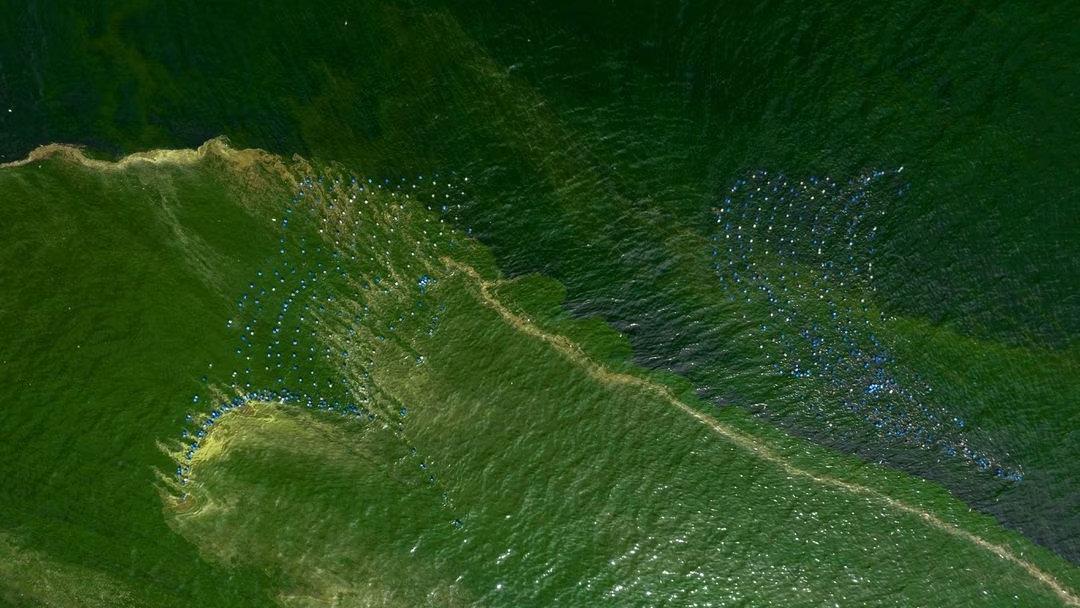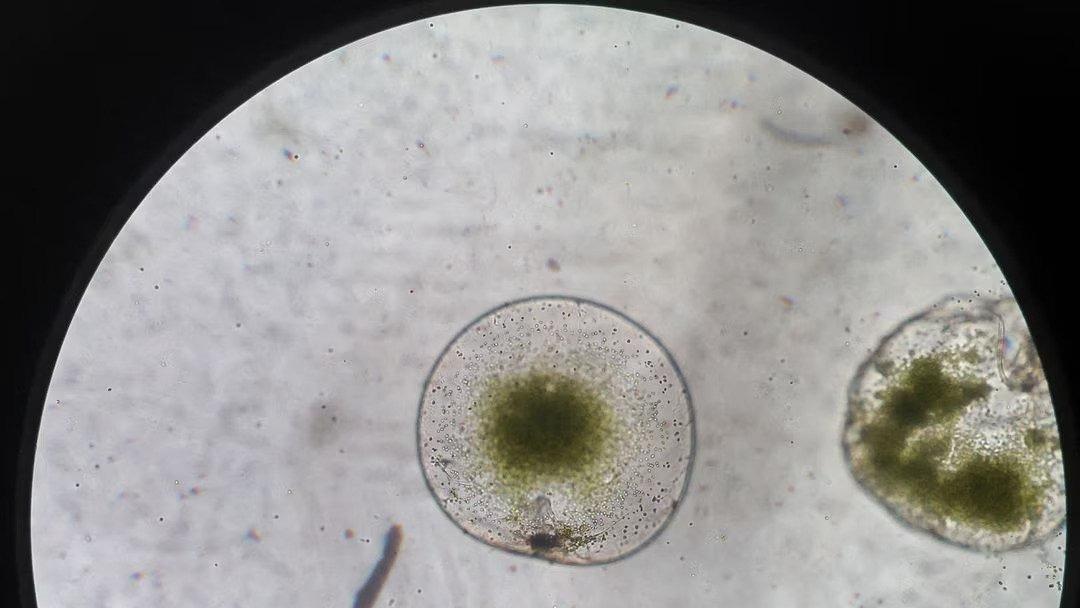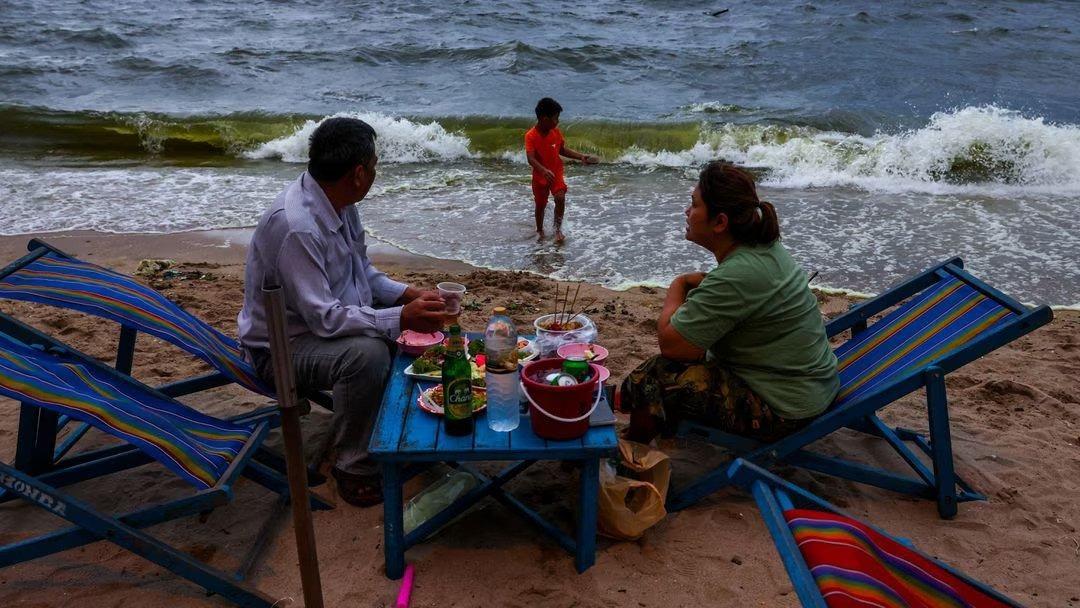 Tanuspong Pokavanich, a marine scientist from Kasetsart University, pours sample of green sea water caused by plankton bloom at Chonburi's coastline, Thailand, Sept 14, 2023. (NAPAT WESSHASARTAR / REUTERS)
Tanuspong Pokavanich, a marine scientist from Kasetsart University, pours sample of green sea water caused by plankton bloom at Chonburi's coastline, Thailand, Sept 14, 2023. (NAPAT WESSHASARTAR / REUTERS)
CHONBURI — An unusually dense plankton bloom off the eastern coast of Thailand is creating an aquatic "dead zone", threatening the livelihood of local fishermen who farm mussels in the waters.
Marine scientists say some areas in the Gulf of Thailand have more than 10 times the normal amount of plankton, turning the water a bright green and killing off marine life.
Chonburi's coasts are famous for their mussel farms, and more than 80 percent of the almost 300 plots in the area has been affected
"This is the first that I've seen it so bad," said marine scientist Tanuspong Pokavanich. "It is very severe."
READ MORE: Thai beach made famous by film set for tourism respite
Plankton blooms happen one or two times a year and typically last two to three days, experts say. They can produce toxins that harm the environment, or they can kill off marine life by depleting the oxygen in the water and blocking sunlight.
Chonburi's coasts are famous for their mussel farms, and more than 80 percent of the almost 300 plots in the area has been affected, said Satitchat Thimkrajong, president of the Chonburi Fisheries Association.
Fisherman Suchat Buwat's plot was one of those impacted. He said the bloom had caused him losses of more than 500,000 baht ($14,000), with his peers also racking up "unfathomable" losses.
While the cause of the intense plankton bloom remains unclear, scientists believe pollution and the intense heat caused by climate change are to blame.
READ MORE: China's tourists hit Thai beaches for 1st time after virus curbs ease
 An aerial view of green sea water caused by plankton bloom at Chonburi's coastline, Thailand, Sept 14, 2023. (NAPAT WESSHASARTAR / REUTERS)
An aerial view of green sea water caused by plankton bloom at Chonburi's coastline, Thailand, Sept 14, 2023. (NAPAT WESSHASARTAR / REUTERS)
 An aerial view of mussel farms surrounded by green sea water caused by plankton bloom at Chonburi's coastline, in Thailand, Sept 14, 2023. (NAPAT WESSHASARTAR / REUTERS)
An aerial view of mussel farms surrounded by green sea water caused by plankton bloom at Chonburi's coastline, in Thailand, Sept 14, 2023. (NAPAT WESSHASARTAR / REUTERS)
 A marine scientist from Kasetsart University, looks through a sample of green sea water caused by plankton bloom via microscope at a lab in Chonburi province, Thailand, Sept 14, 2023. (NAPAT WESSHASARTAR / REUTERS)
A marine scientist from Kasetsart University, looks through a sample of green sea water caused by plankton bloom via microscope at a lab in Chonburi province, Thailand, Sept 14, 2023. (NAPAT WESSHASARTAR / REUTERS)
 Phytoplankton Noctiluca Scintillans is seen through a microscope, at a lab in Chonburi province, Thailand, Sept 14, 2023. (NAPAT WESSHASARTAR / REUTERS)
Phytoplankton Noctiluca Scintillans is seen through a microscope, at a lab in Chonburi province, Thailand, Sept 14, 2023. (NAPAT WESSHASARTAR / REUTERS)
 Pichai, Bell and his son eat their dinner beside green sea water caused by plankton bloom at Bang Saen beach in Chonburi province, Thailand, Sept 14, 2023. (NAPAT WESSHASARTAR / REUTERS)
Pichai, Bell and his son eat their dinner beside green sea water caused by plankton bloom at Bang Saen beach in Chonburi province, Thailand, Sept 14, 2023. (NAPAT WESSHASARTAR / REUTERS)
 A view of green sea water caused by plankton bloom at Bang Saen beach in Chonburi province, Thailand, Sept 14, 2023. (NAPAT WESSHASARTAR / REUTERS)
A view of green sea water caused by plankton bloom at Bang Saen beach in Chonburi province, Thailand, Sept 14, 2023. (NAPAT WESSHASARTAR / REUTERS)
"El Niño causes drought and higher sea temperatures," said Tanuspong. "Everything will get worse if we don't adjust how we manage resources, water waste and how we live."


